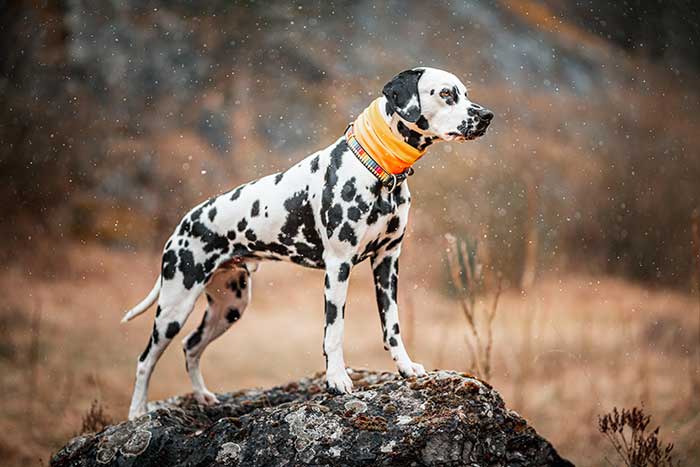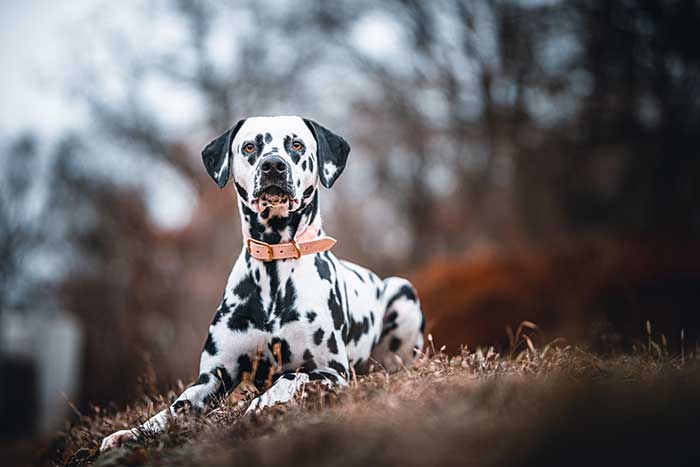Did you know that Dalmatians have a natural protective instinct that dates back to their origins as guard dogs? These unique spotted dogs were originally bred to protect horse-drawn carriages, making them highly alert and protective of their owners. But the question remains, will your Dalmatian protect you?”
Dalmatians have a rich history of serving as protectors, which can give you some peace of mind. With their strong sense of loyalty, Dalmatians are often protective of their family members, including their owners. They are known for being watchful and can quickly detect any potential threats or danger. While individual personalities may vary, many Dalmatians exhibit protective behaviors that make them reliable guardians. So, if you’re looking for a loyal and potentially protective companion, a Dalmatian might just be the perfect fit for you.
Curious about how your dalmatian will protect you? While dalmatians are known for their loyalty and bravery, their protective instincts can vary. Understanding your individual dog’s temperament and training can help determine their protective behavior. Proper socialization, obedience training, and positive reinforcement can enhance your dalmatian’s ability to protect you and your family. It’s important to remember that every dalmatian is unique, so consult with a professional trainer for personalized guidance.

“Will My Dalmatian Protect Me?” – The Truth Revealed
Have you ever wondered if your Dalmatian will protect you in a time of need? Dalmatians are known for their striking appearance and playful personalities, but are they capable of being protective? In this article, we will explore the nature of Dalmatians and determine whether they have the inherent instinct to protect their owners. Whether you’re considering getting a Dalmatian as a guard dog or simply curious about their protective abilities, read on to find out the truth about this beloved breed.
Understanding the Dalmatian Temperament
Before delving into their protective instincts, it’s important to understand the overall temperament of Dalmatians. Dalmatians are known for being friendly, outgoing, and energetic. They are often characterized as playful, spirited dogs that thrive on human companionship. While every Dalmatian is unique and individual temperaments may vary, these general traits are commonly seen in the breed.
Despite their friendly nature, Dalmatians can be aloof with strangers, but this doesn’t necessarily translate into protective behavior. It’s crucial to note that not all Dalmatians exhibit protective instincts to the same degree, as temperament can vary significantly from dog to dog. Whether your Dalmatian will protect you largely depends on various factors, including its genetic makeup, early socialization, and individual personality.
Overall, while Dalmatians may not be known for their protective nature, they can still make excellent companions and family pets. Their affectionate and playful demeanor brings joy and happiness to many households.
Factors That Influence Protective Instincts in Dalmatians
To understand why some Dalmatians may exhibit protective behavior while others may not, it’s crucial to consider the factors that influence their instincts. Here are three key factors that can play a role:
1. Genetics
Genetics play a significant role in a dog’s behavior and temperament. Some lines of Dalmatians may have a stronger protective instinct due to their breeding history. It’s important to research the lineage of your Dalmatian and speak with reputable breeders who prioritize temperament and overall health when selecting their breeding dogs.
While genetics can provide a foundation for protective behavior, it’s important to note that individual variation can still occur. A Dalmatian with a history of protective instincts may not necessarily exhibit such behaviors if it hasn’t been properly trained or socialized.
2. Early Socialization
Early socialization plays a crucial role in shaping a dog’s behavior and can greatly influence their protective instincts. By exposing your Dalmatian to different people, animals, and environments during their critical socialization period, usually between 3 to 14 weeks of age, you can help them develop confidence and positive associations.
Proper socialization can help your Dalmatian differentiate between potential threats and non-threats. A well-socialized Dalmatian is more likely to exhibit a balanced and confident temperament, which may contribute to their protective instincts in certain situations.
3. Training and Reinforcement
Training and reinforcement are essential in developing any desired behavior, including protective instincts. Consistency, positive reinforcement, and rewards-based training methods are effective in shaping your Dalmatian’s behavior and teaching them when to display protective behaviors and when not to.
It’s important to note that training alone may not turn every Dalmatian into a protective guardian. While some Dalmatians may naturally exhibit protective behaviors and can benefit from training to refine and control those instincts, others may require additional guidance.
What to Expect from Your Dalmatian
While Dalmatians may not be renowned for their protective tendencies, each dog is an individual with unique characteristics. Some Dalmatians may surprise you with their protective instincts, while others may not display them as prominently. It’s important to set realistic expectations about your Dalmatian’s protective abilities and prioritize their overall well-being and happiness.
A well-socialized and trained Dalmatian can still be a loyal and loving companion, bringing joy and laughter into your life. Focus on building a strong bond with your Dalmatian through positive reinforcement, engaging activities, and responsible ownership.
Remember, every Dalmatian has the potential to be a devoted and affectionate family member, even if they don’t necessarily fit the stereotype of a protective guard dog. Embrace the unique traits of your Dalmatian and enjoy the journey of creating a fulfilling and enriching life together.
Key Takeaways: Will My Dalmatian Protect Me?
- Your dalmatian may provide some level of protection due to their natural instincts and territorial nature.
- Dalmatians are known to be alert and courageous, making them a potential deterrent to intruders.
- Proper training and socialization are essential to ensure your dalmatian can effectively protect you.
- While dalmatians have a protective nature, they are not typically aggressive guard dogs.
- Creating a strong bond with your dalmatian and providing them with positive reinforcement will enhance their protective instincts.
Frequently Asked Questions
Welcome to our Frequently Asked Questions section where we address common concerns about Dalmatians and their protective instincts. Here, you’ll find answers to questions that may help provide insight into whether or not your Dalmatian will protect you.
1. Do Dalmatians have a natural instinct to protect their owners?
While Dalmatians are known for their loyalty and protective nature, each dog’s temperament may vary. Some Dalmatians may have a stronger instinct to protect their owners, while others may be less inclined to do so. Factors such as individual personality, training, and socialization play a significant role in determining a Dalmatian’s protective instincts. It’s important to note that relying solely on a dog’s breed for protection is not sufficient. Proper training and socialization are crucial to ensure a well-rounded, protective companion.
By providing your Dalmatian with positive reinforcement training, early socialization with humans and other animals, and a loving home environment, you can increase the likelihood of your Dalmatian displaying protective behavior. However, it’s essential to remember that every dog is unique, and results may vary.
2. Can a Dalmatian be trained to protect its owner?
Yes, Dalmatians can be trained to be protective of their owners through proper training techniques. However, it’s important to note that protection training should only be approached by experienced trainers who specialize in this area. Dalmatians are known for being intelligent and trainable, making them a suitable candidate for protection training if done correctly.
It’s crucial to start with basic obedience training to establish a strong foundation before moving on to more advanced protection training. Positive reinforcement techniques, such as reward-based training, are highly effective for Dalmatians. With consistent training, patience, and a professional trainer’s guidance, you can enhance your Dalmatian’s protective instincts and teach them to react appropriately in potentially dangerous situations.
3. Are Dalmatians naturally good guard dogs?
Dalmatians are not typically considered natural guard dogs due to their friendly and outgoing nature. They are known to be excellent family pets and companions, but guarding is not their primary instinct. Dalmatians are more likely to greet strangers with enthusiasm rather than displaying protective behavior.
However, this doesn’t mean that Dalmatians cannot be trained to be alert or to respond to specific situations. With proper training and socialization, they can learn to recognize potential threats and act accordingly. It is essential to manage expectations and understand that a Dalmatian may not exhibit the same level of protectiveness as other breeds specifically bred for guarding purposes.
4. How can I encourage my Dalmatian to be more protective?
If you would like your Dalmatian to be more protective, there are certain things you can do to encourage this behavior. First and foremost, ensure your Dalmatian receives proper obedience training and socialization from an early age. This helps establish a strong bond between you and your dog, as well as building their confidence.
Additionally, exposing your Dalmatian to different environments, people, and situations will help them develop better judgment and awareness. Engaging in activities such as agility training, advanced obedience training, or even participating in dog sports can also boost your Dalmatian’s confidence and overall assertiveness. However, it’s essential to consult with a professional trainer before engaging in any specialized training to ensure it aligns with your dog’s temperament and abilities.
5. Should I rely solely on my Dalmatian for protection?
While Dalmatians can be loyal and protective, relying solely on your dog for protection is not recommended. Dogs should be seen as part of a comprehensive home security plan, which may include measures such as secure doors and windows, alarm systems, and neighborhood watch programs.
Your Dalmatian can act as an added deterrent and provide an alert if someone or something appears threatening. This can buy you time to take appropriate action. However, it’s crucial to remember that no dog can guarantee absolute protection, and their effectiveness may vary depending on individual temperament and training. Therefore, it’s essential to implement a multi-faceted approach to security that encompasses various measures, including your Dalmatian as part of the overall plan.

Would you protect me?? #lazydog #protectme #nothanks #onyourown #dog #dalmatian #shorts #puppy
Summary
So, you’re wondering if your Dalmatian will protect you. Well, while Dalmatians are known to be loyal and protective companions, their ability to act as guard dogs may vary from dog to dog. Some Dalmatians may naturally be more protective, while others may be more laid-back. It’s important to remember that training and socialization play a significant role in how your Dalmatian behaves. By socializing your Dalmatian with different people, animals, and experiences, you can help build their confidence and ensure they are comfortable in various situations. Additionally, enrolling your Dalmatian in obedience training can teach them important commands and reinforce their bond with you.
Overall, while Dalmatians can offer some level of protection, it’s important to remember that they may not be as naturally protective as other breeds specifically bred for guarding. However, with proper training, socialization, and a strong bond with their owner, your Dalmatian can be a loving and loyal companion that brings you joy and a sense of security.
